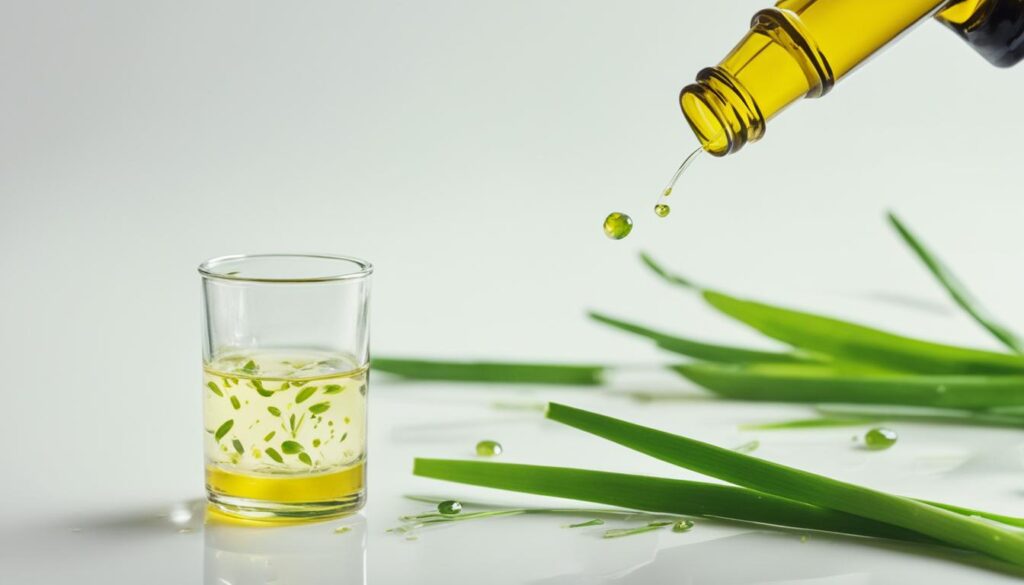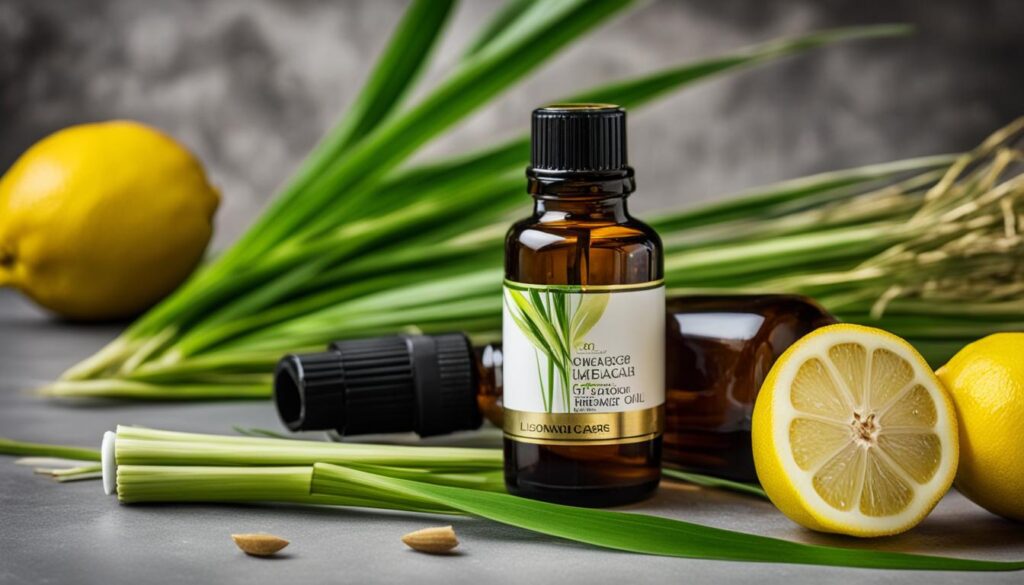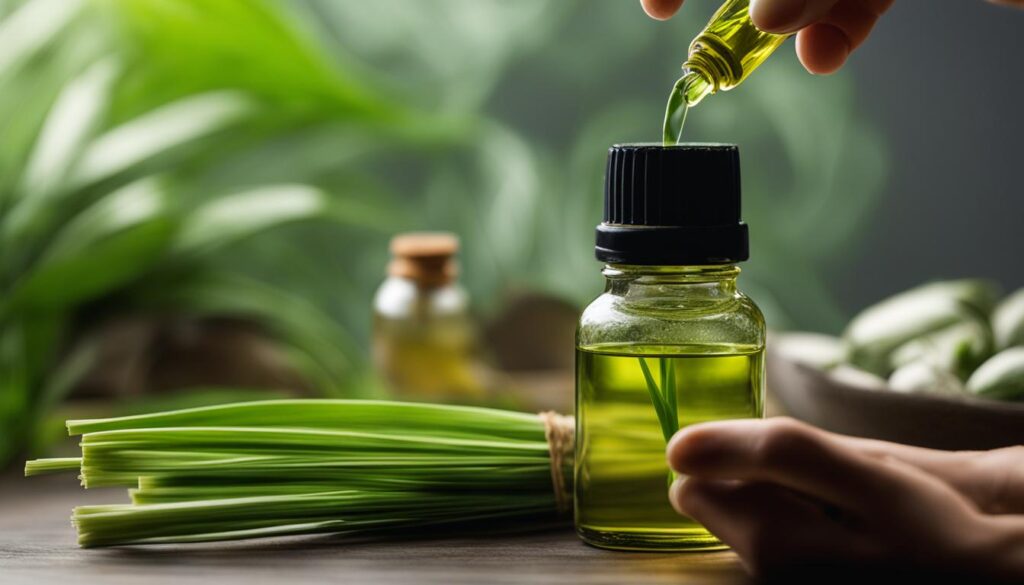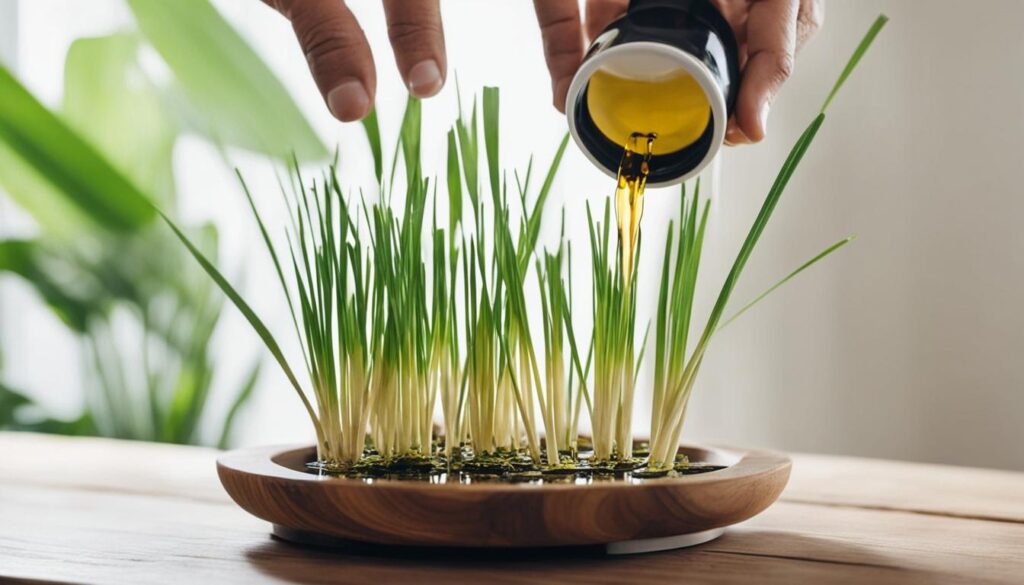Lemongrass oil is a versatile essential oil derived from the leaves and stalks of the lemongrass plant. Its citrusy scent and numerous potential health benefits make it a popular choice in various applications.
When it comes to the uses of lemongrass oil, the possibilities are vast. From culinary delights to skincare and relaxation, this oil offers a range of benefits that can enhance your well-being and daily life.
Let’s explore some of the key benefits and ways to use lemongrass oil:
Key Takeaways:
- Lemongrass oil is derived from the lemongrass plant and has a refreshing citrus scent.
- It has numerous health benefits, including antibacterial, antifungal, anti-inflammatory, and antioxidant properties.
- Ways to use lemongrass oil include aromatherapy, topical application for skincare and haircare, and as a natural bug repellent.
- Lemongrass oil may aid in digestion, reduce cholesterol levels, regulate blood sugar, relieve pain, and promote relaxation.
- When using lemongrass oil, it is important to follow proper application methods and consider potential risks or interactions.
Antibacterial and Antifungal Properties

Lemongrass oil is prized for its potent antibacterial and antifungal properties, making it a versatile remedy for various infections and wounds. Studies have shown that it effectively combats drug-resistant bacteria and certain types of fungi, including those responsible for skin infections, pneumonia, and athlete’s foot.
When applied topically or incorporated into skincare and personal care products, lemongrass oil can aid in wound healing, prevent infection, and treat bacterial and fungal conditions. Its natural properties make it an excellent alternative to conventional antimicrobial agents.
“Lemongrass oil provides a natural and effective solution for fighting bacteria and fungi, offering a range of therapeutic applications.”
– Dr. Jane Stevens, Dermatology Specialist
A table below provides a summary of the antibacterial and antifungal benefits of lemongrass oil:
| Infections | Benefits |
|---|---|
| Skin infections | Eliminates bacteria and fungi responsible for infections, such as acne, eczema, and ringworm |
| Pneumonia and respiratory infections | Helps reduce the growth of bacteria causing respiratory infections and aids in clearing airways |
| Athlete’s foot | Fights the fungus causing athlete’s foot and relieves associated symptoms of itching and discomfort |
Whether it’s treating a stubborn skin infection or preventing the spread of harmful bacteria, lemongrass oil offers a natural and effective solution with minimal side effects. Its versatile applications make it a valuable addition to any holistic wellness routine.
Anti-inflammatory and Antioxidant Effects

Lemongrass oil offers a range of benefits for both skincare and hair health. Its unique combination of anti-inflammatory and antioxidant effects makes it a valuable addition to any beauty routine.
When it comes to skincare, lemongrass oil can help reduce inflammation, fight free radicals, and promote overall skin health. Its anti-inflammatory properties are especially beneficial for those dealing with conditions like arthritis or cardiovascular disease. Adding lemongrass oil to skincare products can help soothe the skin and reduce the signs of aging.
For hair care, lemongrass oil can nourish the scalp, stimulate hair growth, and combat dandruff. The oil’s antioxidant properties are particularly effective at fighting free radicals that can damage the hair and scalp, helping to maintain healthy and vibrant locks.
Digestive Health and Gastric Ulcers

Lemongrass oil has long been recognized for its potential benefits in promoting digestive health and providing relief from gastric ulcers. As a natural remedy, it has been used for centuries to alleviate stomachaches and aid in digestion.
Lemongrass oil for culinary use:
Lemongrass oil can be added to culinary applications to enhance the flavor of dishes and support healthy digestion. Its aromatic and citrusy notes make it a popular choice in various cuisines across the world. By incorporating lemongrass oil into your cooking, you can not only elevate the taste but also enjoy potential digestive benefits.
Lemongrass oil for digestive problems:
Lemongrass oil has been found to have properties that may help prevent gastric ulcers and relieve nausea. While traditional usage has shown promising results in managing these conditions, it is essential to acknowledge that more scientific research is necessary to fully understand and validate the extent of these effects.
| Benefits of Lemongrass Oil for Digestive Health |
|---|
| Supports healthy digestion |
| Potentially prevents gastric ulcers |
| Relieves nausea |
When using lemongrass oil for digestive purposes, it is crucial to follow proper guidelines and consult with a healthcare professional if needed. Although it is generally considered safe, individual sensitivities and allergies can vary. Always remember to use lemongrass oil in moderation and be aware of any potential interactions or risks.
Diarrhea Relief and Cholesterol Reduction

Lemongrass oil offers potential benefits for individuals seeking relief from diarrhea and those looking to reduce their cholesterol levels. Studies conducted on animals have shown that lemongrass oil has the ability to slow down diarrhea and reduce fecal output. Additionally, research using animal models has indicated that lemongrass oil can help lower cholesterol levels, especially LDL cholesterol.
These findings suggest that lemongrass oil may be a valuable natural remedy for individuals dealing with diarrhea or elevated cholesterol. However, it is important to note that further research is required to gather more conclusive evidence and fully understand the extent of these effects.
Lemongrass oil’s potential to alleviate diarrhea and lower cholesterol makes it an intriguing option for individuals seeking natural remedies for these health concerns. By incorporating lemongrass oil into their wellness routines, individuals may find relief from diarrhea symptoms and experience improvements in their cholesterol levels.
Blood Sugar Regulation and Pain Relief

Lemongrass oil has shown promising results in regulating blood sugar levels and providing pain relief for various conditions.
For individuals with type 2 diabetes, lemongrass oil may be beneficial in helping to lower blood sugar levels. Research suggests that certain compounds present in lemongrass oil can enhance the body’s insulin sensitivity, leading to improved blood glucose control and management.
In addition to its effects on blood sugar, lemongrass oil also exhibits pain-relieving properties. The oil’s anti-inflammatory and analgesic attributes contribute to its potential in reducing pain associated with conditions such as rheumatoid arthritis and headaches.
However, it is important to note that further research is needed to determine the optimal dosage and potential long-term effects of using lemongrass oil for blood sugar regulation and pain relief.
| Potential Benefits of Lemongrass Oil |
|---|
| Regulation of blood sugar levels in individuals with type 2 diabetes |
| Reduction of pain associated with rheumatoid arthritis and headaches |
| Anti-inflammatory and analgesic effects |
Stress and Anxiety Reduction

Aromatherapy with lemongrass oil is a natural and effective way to reduce stress and anxiety. The soothing scent of lemongrass oil has a calming effect on the mind and body, making it an ideal choice for relaxation and improving overall well-being.
Combining lemongrass oil with massage can enhance its therapeutic effects. Research has shown that lemongrass oil massage can lower blood pressure and induce a sense of deep relaxation.
To experience the stress-reducing benefits of lemongrass oil, there are a few different methods you can try:
- Diffusion: Add a few drops of lemongrass oil to a diffuser and let the aromatic mist fill the room, creating a peaceful and calming atmosphere.
- Bath: Add a few drops of lemongrass oil to your bathwater for a luxurious and relaxing soak. The warm water combined with the soothing scent of lemongrass oil will help melt away stress and tension.
- Massage: Dilute lemongrass oil with a carrier oil, such as jojoba or coconut oil, and massage it into your skin. The gentle pressure combined with the calming aroma of lemongrass oil will help release tension and promote relaxation.
Using lemongrass oil in aromatherapy and massage can be a wonderful addition to your self-care routine, providing a natural and holistic way to manage stress and anxiety.
Headache Relief and Migraine Prevention
When it comes to finding relief from headaches and migraines, lemongrass oil may be a natural solution worth considering. This essential oil contains a compound called eugenol, which has been found to have similar effects to aspirin.
Eugenol in lemongrass oil can help prevent blood platelets from clumping together, a process that contributes to the formation of blood clots. Additionally, it is believed to stimulate the release of serotonin, a hormone that helps regulate mood and pain perception.
While more research is needed to fully understand the mechanism of action, lemongrass oil has been used as a traditional remedy for headaches for centuries. Its aromatic properties make it an ideal choice for aromatherapy, where the oil can be used in diffusers to create a calming and soothing atmosphere.
For those seeking topical relief, lemongrass oil can be applied directly to the temples or forehead. It is important to dilute the oil with a carrier oil, such as jojoba or coconut oil, before applying to the skin to avoid any potential skin irritation.
| Potential Benefits of Lemongrass Oil for Headaches |
|---|
| Provides natural relief from headaches and migraines |
| Contains eugenol, which has similar effects to aspirin |
| Prevents blood platelets from clumping together |
| Stimulates the release of serotonin, a hormone that regulates mood and pain perception |
| Can be used in diffusers for aromatherapeutic effects |
| May provide a calming and soothing atmosphere |
How to Use Lemongrass Oil

Lemongrass oil offers a myriad of benefits and can be used in various ways to suit your needs. Here are some tips on how to maximize its application:
Topical Application:
Dilute lemongrass oil with a carrier oil, such as coconut or jojoba oil, before applying it directly to your skin. This helps prevent skin irritation and sensitivity. Perform a patch test on a small area of skin before using lemongrass oil topically to ensure you don’t have an allergic reaction. Apply the diluted oil to affected areas, gently massaging it into the skin for optimal absorption. Lemongrass oil can be used to address skin concerns, such as acne, fungal infections, and inflammation.
Aromatherapy:
Inhaling the invigorating scent of lemongrass oil can promote relaxation and uplift your mood. You can add a few drops of lemongrass oil to a diffuser to enjoy its aromatic benefits at home or in the office. Alternatively, you can inhale the oil directly from the bottle for a quick pick-me-up during the day.
Bath Soak:
Add a few drops of lemongrass oil to your bathwater for a rejuvenating and soothing soak. This is especially beneficial for relieving muscle tension and promoting relaxation. The aromatic properties of lemongrass oil can create a spa-like experience and help you unwind after a long day.
Caution:
While lemongrass oil offers numerous benefits, it’s important to exercise caution when using it. Avoid direct ingestion of lemongrass oil, as it can be toxic. Always dilute the oil with a carrier oil before applying it to your skin. Perform a patch test to check for any adverse reactions. If you have any underlying health conditions or are pregnant, consult with a healthcare professional before using lemongrass oil.
Remember to use lemongrass oil in moderation and under the guidance of a healthcare professional if needed. With proper application and a mindful approach, you can make the most of this versatile essential oil and reap its many benefits.
Selecting the Best Quality Lemongrass Oil
To ensure the best quality lemongrass oil, it is important to choose a reputable brand that adheres to industry standards. Look for organic oils that are manufactured by brands affiliated with the National Association for Holistic Aromatherapy. These oils are more likely to be pure and free from contaminants. Additionally, consider the sourcing and harvesting practices of the brand. Lemongrass oil sourced from regions with higher rainfall tends to have higher citral content, which makes it superior for essential oil use.
| Factors to Consider | Quality Criteria |
|---|---|
| Brand Reputation | Choose a reputable brand known for producing high-quality essential oils. |
| Organic Certification | Look for oils that are certified organic, ensuring they are free from pesticides and other harmful chemicals. |
| Affiliation with Industry Organizations | Brands associated with the National Association for Holistic Aromatherapy are more likely to follow best practices. |
| Country of Origin | Lemongrass oil sourced from regions known for their high-quality crops, such as India or Thailand, may offer superior quality. |
| Extraction Method | Ensure the oil is extracted through methods like steam distillation or cold-pressing to maintain its integrity. |
| Citral Content | Lemongrass oil with higher citral content (such as Cymbopogon citratus) offers a more potent and aromatic experience. |
By considering these factors when choosing lemongrass oil, you can ensure that you are getting a high-quality product with optimal purity and therapeutic benefits.
Proper Storage of Lemongrass Oil
Proper storage of lemongrass oil is crucial to maintain its quality and effectiveness. Follow these storage tips to ensure your lemongrass oil remains potent and ready to use:
- Keep it cool and dark: Store the oil in a cool, dark place away from direct sunlight and heat sources. Exposure to light and heat can cause the oil to deteriorate and lose its beneficial properties.
- Tightly seal the bottle: Ensure that the bottle is tightly sealed to prevent oxidation and contamination. A tightly sealed bottle helps maintain the freshness and integrity of the oil.
- Avoid moisture: Avoid storing lemongrass oil in the bathroom or near moisture. Moisture can degrade the oil and reduce its effectiveness. Choose a dry location for optimal storage.
By following these storage tips, you can extend the shelf life of your lemongrass oil and ensure its maximum potency for 1-2 years.
Summary and Final Thoughts
Lemongrass oil is a versatile essential oil that offers a myriad of uses and potential health benefits. Whether you’re seeking skincare solutions, hair care remedies, relaxation techniques, or bug repellents, lemongrass oil has got you covered. With its antibacterial, antifungal, anti-inflammatory, and antioxidant properties, this powerful oil can effectively address various health concerns.
When it comes to digestive problems, cholesterol reduction, blood sugar regulation, and pain relief, lemongrass oil has shown promising results. Incorporating lemongrass oil into your routine can provide relief, support overall well-being, and promote a healthier lifestyle.
However, it is crucial to follow proper application methods and consider any potential risks or interactions. Always dilute lemongrass oil with a carrier oil before applying it to the skin, and perform a patch test beforehand. Additionally, never ingest lemongrass oil directly, and seek professional guidance if necessary.
In conclusion, lemongrass oil is a valuable addition to your natural wellness toolkit. Embrace its wide-ranging benefits and enjoy its soothing effects on the mind, body, and soul. Discover the versatility and potential that lemongrass oil brings to your daily life.
FAQ
What are the uses and benefits of lemongrass oil?
Lemongrass oil has numerous potential health benefits, including antibacterial, antifungal, anti-inflammatory, and antioxidant properties. It can be used for skincare, hair care, aromatherapy, relaxation, and as a bug repellent.
How can lemongrass oil be used for skincare?
Lemongrass oil can be added to skincare products for its anti-aging and skin-soothing effects. It nourishes the skin and promotes overall skin health.
Can lemongrass oil be used for hair care?
Yes, lemongrass oil can be added to hair care products to nourish the scalp, promote hair growth, and reduce dandruff.
What are the antibacterial and antifungal properties of lemongrass oil?
Lemongrass oil has potent antibacterial and antifungal properties. It can be used to heal wounds, prevent infection, and treat various bacterial and fungal infections.
Does lemongrass oil have anti-inflammatory and antioxidant effects?
Yes, lemongrass oil exhibits anti-inflammatory and antioxidant effects, making it beneficial for reducing inflammation, fighting free radicals, and promoting overall skin and hair health.
How can lemongrass oil benefit digestive health and gastric ulcers?
Lemongrass oil has long been used as a natural remedy for digestive problems. It may help prevent gastric ulcers, relieve stomachaches, and alleviate nausea.
Can lemongrass oil provide relief for diarrhea and help reduce cholesterol?
Lemongrass oil has been found to slow down diarrhea and decrease cholesterol levels, particularly LDL cholesterol. It may be beneficial for individuals with diarrhea or high cholesterol.
Does lemongrass oil help regulate blood sugar levels and provide pain relief?
Yes, lemongrass oil has shown potential in regulating blood sugar levels in individuals with type 2 diabetes. It may also help reduce pain associated with conditions like rheumatoid arthritis and headaches.
How can lemongrass oil be used for stress and anxiety reduction?
Aromatherapy with lemongrass oil can help reduce stress and anxiety. The pleasant scent and calming properties of lemongrass oil promote relaxation and improve overall well-being.
Does lemongrass oil provide relief for headaches and migraines?
Lemongrass oil contains compounds that have been found to have similar effects to aspirin. It may provide relief for headaches and migraines when applied topically or used in diffusers for aromatherapeutic effects.
How should lemongrass oil be used?
Lemongrass oil can be diluted with a carrier oil and applied topically, added to bathwater for a relaxing soak, inhaled directly, or used in diffusers for aromatherapy. Always perform a patch test before topical use, and avoid direct ingestion.
How can I select the best quality lemongrass oil?
To ensure the best quality, choose a reputable brand that adheres to industry standards. Look for organic oils manufactured by brands affiliated with the National Association for Holistic Aromatherapy. Consider the sourcing and harvesting practices of the brand.
What are the proper storage practices for lemongrass oil?
Store lemongrass oil in a cool, dark place away from direct sunlight and heat sources. Ensure the bottle is tightly sealed to prevent oxidation and contamination. Avoid storing it in the bathroom or near moisture.
In summary, what are the uses and benefits of lemongrass oil?
Lemongrass oil is a versatile essential oil with uses for skincare, hair care, aromatherapy, relaxation, and bug repellent. It has antibacterial, antifungal, anti-inflammatory, and antioxidant properties. It may help with digestive problems, reduce cholesterol and blood sugar levels, relieve pain, and promote overall well-being.






